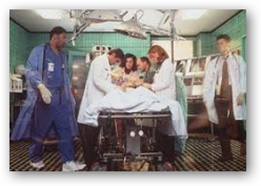Part of the reason here too could be combined with getting information with patients that are conscious and not in a trauma situation. The emergency room physicians want and need almost every stick of information they can get their hands on. In years past we didn’t have the multitude  of diagnoses that we have today, nor did we have the huge number of drugs, which of course leads to more searching for interactions. The more drugs you have for treatment, the more searching that needs to be done.
of diagnoses that we have today, nor did we have the huge number of drugs, which of course leads to more searching for interactions. The more drugs you have for treatment, the more searching that needs to be done.
Sometimes this part of the stay just can’t be done any faster without risking safety and this makes a good point of having a personal health record with you and available, as it could stand to save your life.
In the meantime the other reasons for longer length of stay will continue to be analyzed. BD
WASHINGTON, July 23 /PRNewswire-USNewswire/ -- Average length of stay in the nation's emergency departments increased to four hours and seven minutes, and the nation's emergency physicians are very concerned about patient safety being jeopardized by long wait times. Press Ganey's Pulse Report 2010, released yesterday, confirms what the American College of Emergency Physicians has reported previously: The recession, high unemployment and insurance losses are increasing pressure on emergency departments and their patients.
Dr. Angela Gardner, president of the American College of Emergency Physicians, assessed the report's findings:
"The report finds pockets of good news, such as shorter times overall in Nevada, but nobody can possibly call a national average of more than four hours in the emergency department something to cheer about. Last year the GAO reported that even patients who need to be seen in 1 to 14 minutes are waiting an average of 37 minutes for care. Emergency physicians have become masters of improvisation and troubleshooting under extreme conditions, but the fundamental problems in our emergency departments remain unsolved.
"This report is yet another wake-up call that health care reform has yet to address the acute care needs of 123 million emergency patients a year. They may report being satisfied with the care they are receiving in the ER, but emergency physicians are dissatisfied with an average time in the emergency department that is nearly equal to a coast to coast airplane ride."
"This report is yet another wake-up call that health care reform has yet to address the acute care needs of 123 million emergency patients a year. They may report being satisfied with the care they are receiving in the ER, but emergency physicians are dissatisfied with an average time in the emergency department that is nearly equal to a coast to coast airplane ride."



0 comments :
Post a Comment